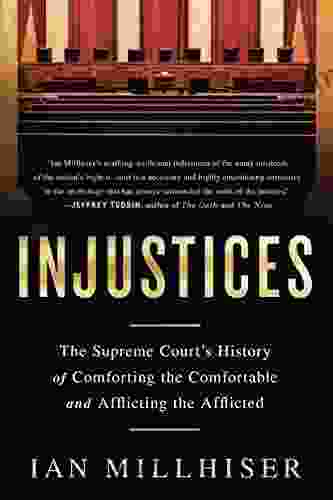Unveiling the Supreme Court's Unjust Legacy: "Comforting the Comfortable and Afflicting the Afflicted"

The Supreme Court of the United States, widely regarded as the apex of the judicial system, has a profound influence on the lives of all Americans. However, a critical examination of its history reveals a deeply troubling pattern of favoring the interests of the wealthy and powerful at the expense of the marginalized and vulnerable. This article explores this disturbing trend, shedding light on the ways in which the Court has systematically "comforted the comfortable and afflicted the afflicted."
4.6 out of 5
| Language | : | English |
| File size | : | 1834 KB |
| Text-to-Speech | : | Enabled |
| Screen Reader | : | Supported |
| Enhanced typesetting | : | Enabled |
| Word Wise | : | Enabled |
| Print length | : | 370 pages |
Historical Context
The origins of the Supreme Court's inherent bias can be traced back to the founding of the nation itself. The Founding Fathers, many of whom were wealthy landowners and slave owners, crafted a Constitution that enshrined property rights and limited the power of the federal government. This framework created a legal system that was inherently favorable to the wealthy elite.
Landmark Cases
Numerous landmark Supreme Court decisions have exemplified the Court's tendency to prioritize the interests of the privileged. In 1896, the Court ruled in Plessy v. Ferguson that segregation of public facilities based on race was constitutional, upholding the practice of "separate but equal" that persisted for decades. Similarly, the Court's decision in Citizens United v. FEC (2010) overturned restrictions on corporate spending in elections, giving corporations and the wealthy undue influence over the political process.
Economic Inequality
The Supreme Court's bias has had a significant impact on economic inequality in the United States. Through decisions such as Shelby County v. Holder (2013),which struck down a key provision of the Voting Rights Act, the Court has made it more difficult for marginalized groups to participate in the political process. Additionally, the Court's hostility towards unions and support for deregulation have contributed to a decline in wages and a widening wealth gap.
Criminal Justice
The Supreme Court has also played a role in perpetuating racial disparities in the criminal justice system. In Ruiz v. California (1983),the Court ruled that overcrowding in prisons violates the Eighth Amendment's prohibition against cruel and unusual punishment. However, it has simultaneously upheld harsh sentencing policies and limited the rights of defendants, disproportionately impacting minority communities.
Environmental Protection
The Court's decisions have also had a profound impact on environmental protection. In recent years, the Court has repeatedly ruled in favor of corporations and against environmental regulations. For example, in West Virginia v. EPA (2022),the Court limited the Environmental Protection Agency's ability to regulate greenhouse gas emissions, a major contributor to climate change.
The Supreme Court's history of "comforting the comfortable and afflicting the afflicted" is undeniable. Through its decisions, the Court has systematically favored the interests of the wealthy and powerful, while undermining the rights and protections of the marginalized and vulnerable. It is imperative that we recognize and address this systemic bias if we are to create a more just and equitable society for all.
Call to Action
The legacy of the Supreme Court cannot be changed overnight. However, we can take steps to hold the Court accountable and advocate for policies that protect the interests of all Americans, regardless of their wealth or status. We must demand that the Court uphold its constitutional duty to serve as a check on power and a protector of the rights of all.
Alt Attributes for Images
* Image 1: A vintage photograph of the Supreme Court building in Washington, D.C. * Image 2: A group of protesters holding signs outside the Supreme Court building, demanding justice. * Image 3: A data visualization showing the increasing wealth gap in the United States. * Image 4: A photo of prisoners in a crowded jail cell, highlighting racial disparities in the criminal justice system. * Image 5: An aerial view of a coal-fired power plant, illustrating the Supreme Court's impact on environmental regulations.
4.6 out of 5
| Language | : | English |
| File size | : | 1834 KB |
| Text-to-Speech | : | Enabled |
| Screen Reader | : | Supported |
| Enhanced typesetting | : | Enabled |
| Word Wise | : | Enabled |
| Print length | : | 370 pages |
Do you want to contribute by writing guest posts on this blog?
Please contact us and send us a resume of previous articles that you have written.
 Book
Book Novel
Novel Page
Page Chapter
Chapter Text
Text Story
Story Genre
Genre Reader
Reader Library
Library Paperback
Paperback E-book
E-book Magazine
Magazine Newspaper
Newspaper Paragraph
Paragraph Sentence
Sentence Bookmark
Bookmark Shelf
Shelf Glossary
Glossary Bibliography
Bibliography Foreword
Foreword Preface
Preface Synopsis
Synopsis Annotation
Annotation Footnote
Footnote Manuscript
Manuscript Scroll
Scroll Codex
Codex Tome
Tome Bestseller
Bestseller Classics
Classics Library card
Library card Narrative
Narrative Biography
Biography Autobiography
Autobiography Memoir
Memoir Reference
Reference Encyclopedia
Encyclopedia Arnold Thomas Fanning
Arnold Thomas Fanning Annie Payson Call
Annie Payson Call Asharani Mathur
Asharani Mathur Tosca Lee
Tosca Lee Phil Barlow
Phil Barlow Ed Bell
Ed Bell Anna L Raimondi
Anna L Raimondi Barry Zalma
Barry Zalma Sergey Filonov
Sergey Filonov Antonia Hall
Antonia Hall Joanna Kujath
Joanna Kujath Anna Elliott
Anna Elliott Arielle Essex
Arielle Essex Mike Maihack
Mike Maihack Christine Hardy
Christine Hardy Antwone J Morris
Antwone J Morris Ashley Haseotes
Ashley Haseotes Ashley Davis Bush
Ashley Davis Bush Greig Beck
Greig Beck Candace Carroll
Candace Carroll
Light bulbAdvertise smarter! Our strategic ad space ensures maximum exposure. Reserve your spot today!

 Bobby HowardAtlas of Hand-Made Human Histology Diagrams: A Visual Masterpiece Unraveling...
Bobby HowardAtlas of Hand-Made Human Histology Diagrams: A Visual Masterpiece Unraveling...
 Ryūnosuke AkutagawaThe Elephants in the Land of Enchantment: An Extraordinary Adventure into the...
Ryūnosuke AkutagawaThe Elephants in the Land of Enchantment: An Extraordinary Adventure into the... Richard AdamsFollow ·16.6k
Richard AdamsFollow ·16.6k Wesley ReedFollow ·13.3k
Wesley ReedFollow ·13.3k John GrishamFollow ·9k
John GrishamFollow ·9k Kenneth ParkerFollow ·15.1k
Kenneth ParkerFollow ·15.1k Ira CoxFollow ·2k
Ira CoxFollow ·2k Curtis StewartFollow ·13.8k
Curtis StewartFollow ·13.8k Raymond ChandlerFollow ·8.7k
Raymond ChandlerFollow ·8.7k Cason CoxFollow ·6k
Cason CoxFollow ·6k

 Jeremy Cook
Jeremy CookDrawing and Illustrations of the 18th Century: A Journey...
Step into the...

 Easton Powell
Easton PowellPhysician Experience With Obstructive Sleep Apnea: The...
Obstructive sleep apnea (OSA) is a common...

 Cruz Simmons
Cruz SimmonsUnlock Your Inner Healer: The Transformative Power of...
Are you ready to embark on a profound healing...

 Paulo Coelho
Paulo CoelhoTransmission Awakening In Time Of Transition Vol. 1: A...
Transmission Awakening...
4.6 out of 5
| Language | : | English |
| File size | : | 1834 KB |
| Text-to-Speech | : | Enabled |
| Screen Reader | : | Supported |
| Enhanced typesetting | : | Enabled |
| Word Wise | : | Enabled |
| Print length | : | 370 pages |












